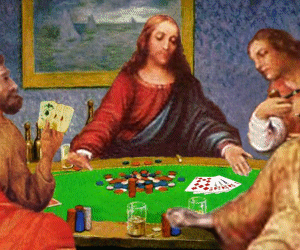 This is Spinoza’s argument regarding miracles: The true expression of the will of God is the laws of nature. These laws are immutable. Miracles contravene the laws of nature. Therefore, to maintain that miracles really occurred is to maintain that the will of God can be thwarted which us tantamount to atheism. What are described as miracles in the Bible and other ancient writings are in reality natural occurrences. These are thought to be unnatural because (1) We have not yet discovered their natural causes, or (2) Their reporting is due to poetic license or misunderstood turns of phrase from the Hebrew. Spinoza’s is a very clever argument indeed and concludes with the joyful observation that believers in miracles actually prove the opposite of what they set out to demonstrate. A
This is Spinoza’s argument regarding miracles: The true expression of the will of God is the laws of nature. These laws are immutable. Miracles contravene the laws of nature. Therefore, to maintain that miracles really occurred is to maintain that the will of God can be thwarted which us tantamount to atheism. What are described as miracles in the Bible and other ancient writings are in reality natural occurrences. These are thought to be unnatural because (1) We have not yet discovered their natural causes, or (2) Their reporting is due to poetic license or misunderstood turns of phrase from the Hebrew. Spinoza’s is a very clever argument indeed and concludes with the joyful observation that believers in miracles actually prove the opposite of what they set out to demonstrate. A
Spinoza attempted to prove that premise in the First Part of his Ethics. There Spinoza begins with the proof of God’s existence that can be drawn from his status as most perfect being (A thing cannot be perfect unless it actually exists). Spinoza asserts that that argument, if it is true beyond reasonable doubt, does no more than prove the existence of the universe itself, whence the identification of God with the universe (Actually, if you want to be tough minded about it, Spinoza got no further than proving that “Something exists”, which is better than nothing.). It is noteworthy that Spinoza can easily shift gears from this heady conceptual level which he says arises from clear and distinct notions and characterizes as “geometrical”, by which he means “absolutely irrefutable”, to arguments like the one in the Appendix to the First Part where he shows how primitives could have come up with the notion of a manlike God. This latter argument is not and is not meant to be absolutely irrefutable. It is better characterized as really convincing. It is also a better answer to the gullible masses who through the long centuries of Judaism and Christianity probably never once gave thought to notions like “perfect, all powerful, necessarily existing being” that early Christian writers basically stole from classical philosophy. Those gullible masses most likely never believed in an all-powerful God or at least never bothered themselves with what that really means. Their God isn’t all-powerful. Just really, really powerful, somewhat like the Wizard of Oz. So he can ordain the laws of nature (from which he is distinct) and then break them if he sees fit. This is of course a contemptible delusion ideally suited for Spinoza’s genetic treatment.
II. However sincere or insincere Spinoza may have been in his identification of God with the laws of nature, i.e. the immutable regularity of the universe, he was unrelenting in his scorn of an anthropomorphic God. Vintage Spinoza: If we followed the example of the masses, we would “imagine a bodily Deity holding a royal court with a throne on the convexity of heaven, above the stars, which are believed to be not very far off from the earth.” It is much to be regretted that the majority of the American masses particularly in the slave-holding South still believe this to be a physical fact.